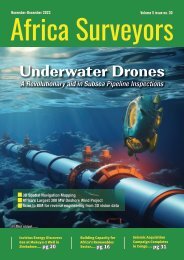Africa Surveyors November-December 2022 digital issue
Africa Surveyors is Africa’s premier source of Surveying, Mapping and Geospatial news and an envoy of surveying products/service for the Construction, Maritime, Onshore & Offshore energy and exploration, Engineering, Oil and Gas, Agricultural and Mining sectors on new solution based trends and technology for the African market.
Africa Surveyors is Africa’s premier source of Surveying, Mapping and Geospatial news and an envoy of surveying products/service for the Construction, Maritime, Onshore & Offshore energy and exploration, Engineering, Oil and Gas, Agricultural and Mining sectors on new solution based trends and technology for the African market.
You also want an ePaper? Increase the reach of your titles
YUMPU automatically turns print PDFs into web optimized ePapers that Google loves.
WASTEWATER TREATMENT
Image: Sewertech Kenya Ltd
on economical treatment methods may be a
solution. Industrialists should also be brought
on board as important stakeholders in the
wastewater management sector. Regulating
institutions should deploy persons with
integrity to the field,” he upholds.
Lack of competent resources
and budget constraints
Karl Juncker, Director (Pr. Eng) at Wecprojects
pinpoints on three major issues facing the
“
A serious re-look
at the way the
treatment industry
is being run and
change of policy
and strategy in
order to rectify
- Karl Juncker -
wastewater industry, but are not limited to:
a. Lack of competent resources
(technical and administrative) in the WSA’s
and municipalities to manage, maintain and
operate the works.
b. Restrictive and slow procurement
processes and an inefficient approach to
resolving the challenge.
c. Budget constraints and the inability
to effectively apply for and process budget
through (an ineffective) supply chain.
“There is not enough budget for the project
from client side. This issue is more likely to
occur in small factories. Basically, we need
to allocate more budget when we use more
land and equipment but its the engineering
cost that is not directly proportional to the
amount of water it treats. The most basic
wastewater system is not cheap and it is not
easy for small factories to afford. Compare
to the big factories, and according to the
wastewater characteristics, maybe they can
just use the basic system to deal with which
is a small expense for them,” Adds Rick.
Poor planning
“Faecal sludge management is another area
of concern. In the sanitation service chain,
proper containment, emptying, transportation,
treatment, and disposal of treatment byproducts
is critical. Some waste finds itself
in the environment due to poor containment
infrastructures such as unlined pit latrines,
unprofessional emptiers that discharge
waste into the environment like in drains
and on abandoned fields along the road
to treatment sites, poor treatment due to
inefficient faecal sludge treatment plants, and
illegal disposal of treatment by-products. It
is recommended to carry out socio-economic
studies that provide adequate data to assist
in the mapping and effective planning of the
management of faecal sludge. A shit-flow
diagram is a good tool for understanding
the sanitation service chain. It provides the
percentage of properly managed waste and
poorly managed waste. This information
is important for planning the reduction of
open defecation and eventual phasing out of
onsite sanitation methods such as unlined
pit latrines, lined pit latrines, VIP toilets, and
septic and conservancy tanks, as towns and
cities transition their waste management
approaches from onsite to water-borne. The
private faecal sludge operators should also
be well-trained and monitored. Separate
wastewater treatment and faecal sludge
treatment are also important to avoid
shock loads on municipal treatment plants.
Decentralized wastewater treatment systems
(DEWATS) are also needed to capture waste
where it is produced rather than focusing
on centralized wastewater treatment. With
DEWATS, wastewater treatment by-products
may be used at the generation catchments,
compared to by-products from centralized
wastewater treatment systems which are
usually in the outskirts of the towns and
difficult to transport back for use in the
catchments,” says Eng. Onunga.
Addressing the wastewater
treatment challenges
Proper infrastructure and
equipment
Management of wastewater is challenging.
The requirement for the management of
dirty water is higher than that of clean
water. Special pumps are required to pump
wastewater and sludge. Breakdown of
electromechanical equipment is a common
22 November-December issue l 2022 www.africasurveyorsonline.com

















